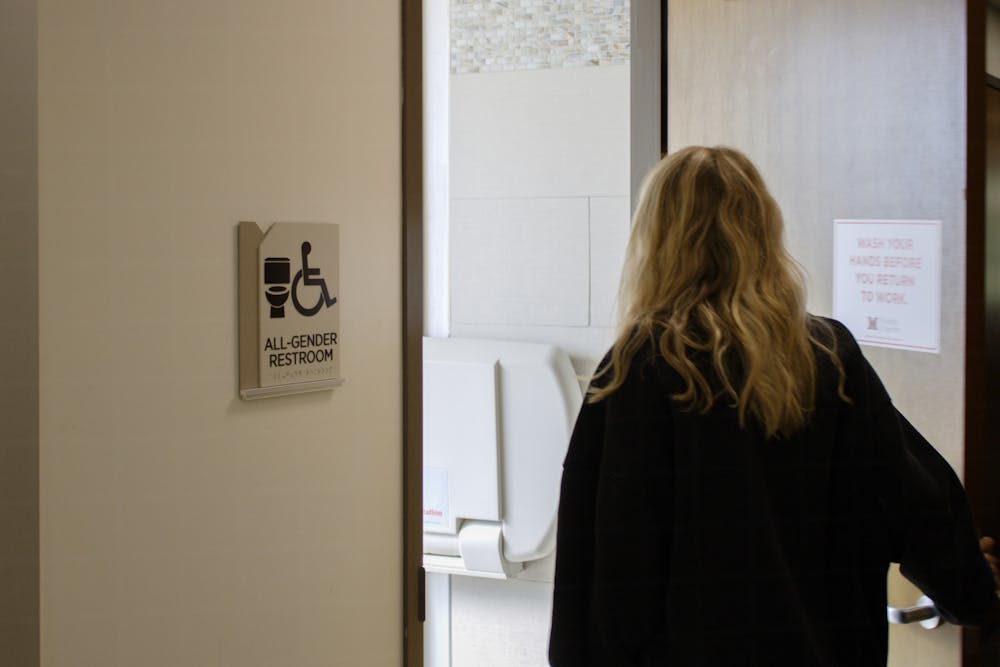A new amendment to an Ohio Senate bill may impact the ability of students and faculty to choose which restroom they use.
Before Ohio Senate Bill 104 (S.B. 104), a bill that would expand the college credit plus program, there was Ohio House Bill 183 (H.B. 183). If passed, it would have required students to use the bathroom of their sex assigned at birth. However, when the bill lost traction, it was added as an amendment to S.B. 104.
Felix K. is a transgender man and sophomore data analytics major at Miami University. Felix said he opposes the bill because he thinks it will create more problems rather than a solution to ongoing social issues.
“Trans individuals who then have to go into the biological bathroom … They’re just going to make those individuals uncomfortable,” Felix said. “I know, some days I'll walk into the women’s bathroom, and I make those girls so uncomfortable, and I can see it on their faces.”
Additionally, Felix worries attempts to enforce the new rule could inadvertently harm cisgender people. He said he believes some cisgender people who don’t present that way may be accused of using the wrong restroom.
Chad Doran, president of Miami’s College Republicans, said he couldn’t make an official statement for the organization's stance on the bill. However, he personally supports it.
“It’s pertinent to schools, and I think it’s becoming a bigger and bigger issue,” Doran said.
Doran added it’s common for controversial bills like H.B. 183 to be added as amendments to more bipartisan bills. He sees it as a strategy; just another part of politics.
“It’s just kind of a rule,” Doran said. “Politics is a dirty game and both sides try to bend the rules a bit. So, I think if one side can do it, why can’t the other?”
Patrick Houlihan, president of the Ohio College Democrats and Miami College Democrats, described the amendment as a way to attack transgender people.
“It’s ridiculous to target people based off unbased fear,” Houlihan said.
Anne Whitesell, an assistant professor of political science, said she disagrees with the amendment and believes fear is a driving factor in these types of amendments.
Enjoy what you're reading?
Signup for our newsletter
“This is a lot of fear-mongering … of being afraid of the unknown,” Whitesell said. “I do think it’s a bill that’s meant to score political points. It’s part of the larger culture war.”
Doran said he also believes the topic has sparked more controversy recently.
“I guess society as a whole has become kind of hyper-focused on gender, and it’s become a big national political issue too, not just at the state level,” Doran said.
Felix doesn’t know how Miami will act toward LGBTQ+ students if the bill is signed into law. He said he did not always feel cared for at Miami, citing harassment issues in the “Love. Honor. Pride.” Living Learning Community in Dorsey Hall last year.
“I don't know how Miami will support queer individuals because they failed us at that aspect,” Felix said.
Doran said he believes Miami can protect its LGBTQ+ students if the bill becomes law as gender-neutral bathrooms would still be available.
Despite Felix’s uncertainty about how the university might react, he is not overly concerned for the same reason.
“We’re still going to have gender-neutral bathrooms,” he said, “and so I'm not too scared.”
Houlihan expects Governor Mike DeWine to sign the bill into law. However, he is still committed to ensuring people’s voices are heard.
“It’s important to hold your representatives accountable,” Houlihan said. “Call their offices. Send them letters. It matters.”




